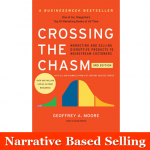If you work in technology, you know Geoffrey Moore is the famous author of “Crossing the Chasm.” This book has sold over 1 million copies, and crossing the chasm has become a metaphor that is universally used by companies with complex products to explain why they struggle to sell to the mainstream market. But you may not know that he also has a PhD in English literature, and this may explain why he is a proponent of narrative based selling.
Q1: Our first question for our guest is does he believe storytelling could help customers cross the chasm? “I am a huge believer in narrative. And if you think about it, particularly before the chasm, it’s 90% narrative.”
Q2: What type of story should a salesperson tell once the customer has crossed the chasm? “To tell a narrative which says “why me and why us.” And it can’t be a narrative which says they’re bad and I’m good, because that narrative is too self-serving and not credible. It has to be a narrative that which says typically they are good at this and we’re good at that. And we think looking at your situation at least looking through our lens you’re in a situation where we’re a better choice than they are.”
Q3: In a tornado, you state that the market leader wins with a transactional sales approach. Is there an opportunity in a tornado for a salesperson to share a story? “If you’re not the gorilla or the number one choice, you still have to do this narrative based selling because now you’ve got to (convince the customer) “Why would I pick you? Shouldn’t I pick the market leader?” And so I would say that what you’re talking about at Insight Selling makes total sense.”
Q4: How does the structure of a story need to change in a sales cycle as the customer crosses the chasm? “The earlier you are in the life cycle the more time you want to spend on the problem (and) the less time you want to spend on the solution, because you want to get alignment around the problem and buy in. And then as the problem becomes more and more accepted and part of the understanding of the customer, then you transfer more of that story to the solution.”
Q5: How can salespeople use stories to inspire customers to change? “Trying to build a new understanding I think it starts fundamentally with story. My best example of this is I’m a venture partner at Mohr Davidow Ventures and so every entrepreneur who pitches us is actually pitching us on a story… And that’s what your book’s about and my book’s about and I think any good book is about is telling stories that let people reimagine how they might you know (say) “Oh my god I’m in a chasm. No wonder I’m not being successful.”
-Michael


